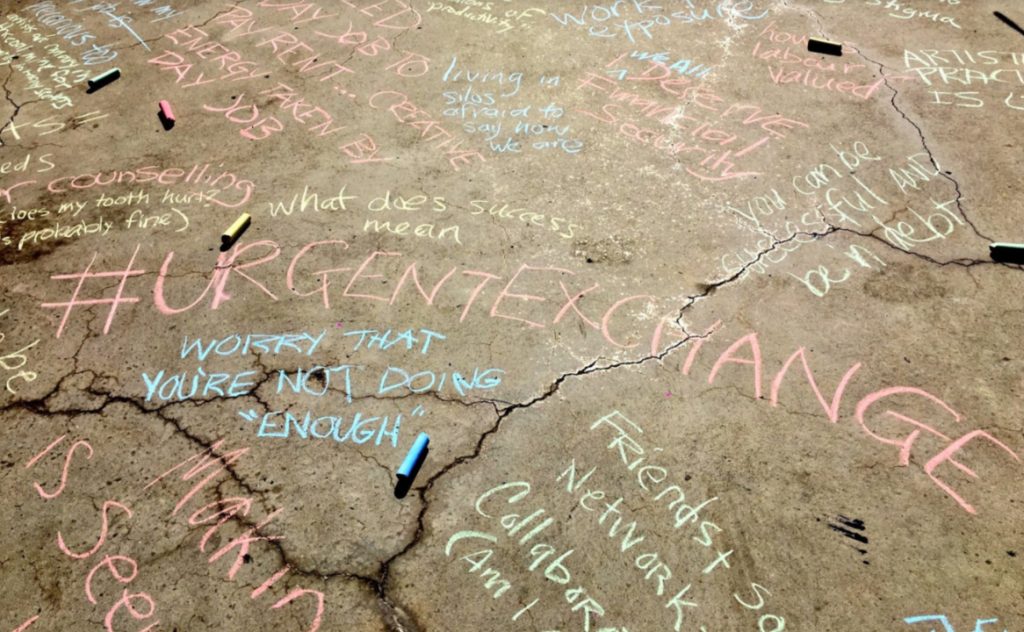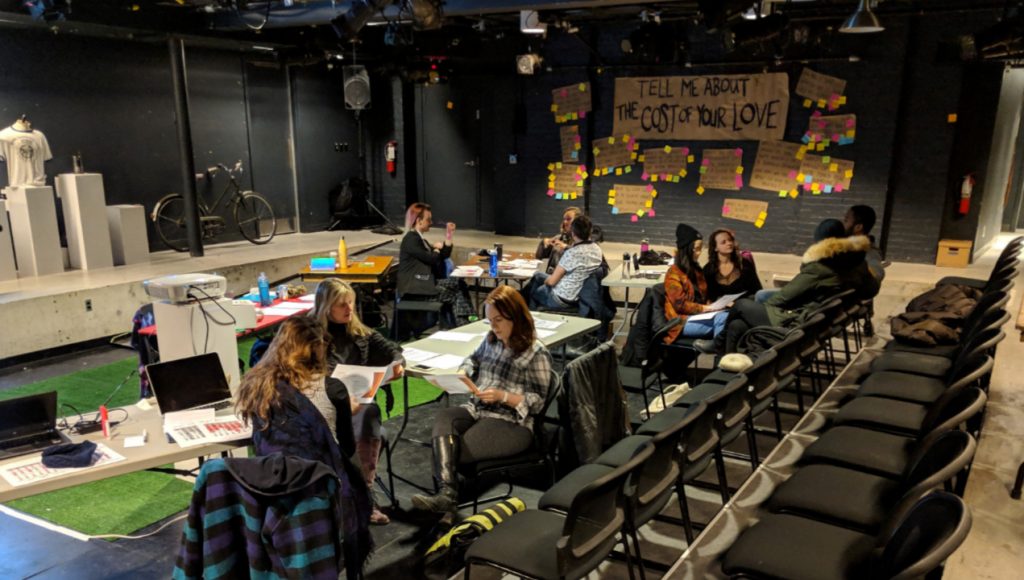Visions for the Future
By Generator

Credit: Annie Clarke
June 16, 2020
In this moment we are facing a number of intersecting and emerging crises in need of immediate action. Systemic anti-Black racism is being exposed, loudly and clearly; a global pandemic is killing people in huge numbers and leading to unprecedented economic disruption.
Since the beginning of the quarantine period, we have seen wonderful thinking, hoping, dreaming and planning about questions related to social justice, capitalism, and the future of the arts sector, from many different voices. We asked the artist community who have gone through Generator’s Artist Producer Training Program what they want to see next. Four months into life with COVID-19, there’s some room to start imagining different futures. To recognize the arts sector isn’t coming back anytime soon, and to ask: what do we want to come back to? What do we want to leave behind? What do we want to remember about this moment? What would it look like for artists to thrive? What are their visions for the future?
Imagination and creativity are the tools of the artist; they are what will drive the reinvention, the tearing down, the new landscapes that will emerge from our current crisis, and that will propel us forward into bolder futures. This article highlights the work artists are already doing to reimagine our sector and demand systemic change; it asks what role arts institutions have to play now, and where they may or may not fit moving forward. But it starts with the basic question: how do we make sure artists survive this?
TURN CERB INTO UBI:
Artists across Canada (and when we say artists we mean performers, musicians, stage managers, producers, production managers, designers – all fee-based, independently-contracted roles that go into producing live performance) are facing a radically uncertain future. And yet, in the midst of all this uncertainty, many of them are experiencing unprecedented levels of financial stability through the Canada Emergency Response Benefit (CERB) – announced this week to continue past its original sixteen-week eligibility period, with details still to come. If four months at $2,000/month doesn’t sound like financial stability to you, you probably haven’t spent much time talking to artists. Generator is advocating for CERB to be extended into a Universal Basic Income (UBI) that would not only stabilize the economic lives of artists, with whom Generator works most closely, but also freelance workers, hospitality workers, and those working on the frontlines in non-essential services (many of whom are, incidentally, also artists).
“I’ve never been in [this] position – to not have to produce or hustle for my next pay cheque. I feel more connected than ever to what I really want to work on artistically, and how I want to spend my time and energy. I think if this continues, I could be in the position to create some of my most alive, rich, and inspired creative work ever.
My vision: Artists being paid to do all aspects of their jobs – grant writing, applications, thinking about future projects, brainstorming, meditating, exercising, keeping up their training and practise. (Not just performing/producing stuff). Artists doing LESS… and being paid more. Less hustle….less pressure to make stuff all the time. More time for process, low-stakes exploration, discovery, risk. TIME OFF. Vacation. Health Benefits. Recognition of the entire lifecycle of a project, and of an artist. We have to be comfortable doing less.” – Jordan Campbell
I want to see Universal Basic Income for everyone. Not just folks in the performance sector, but EVERYONE. I want everyone to know that their fundamental needs for (and rights to) shelter, food, health, and wellness are MET. That they don’t have to EARN these things – they don’t have to PROVE they deserve them through non-stop labour. In my vision we wildly reject “burn out” culture because we’ve wildly EMBRACED a culture and economic system that inherently VALUES and CELEBRATES everyone’s right to exist – to create – to be well – and to flourish. –Susanna Fournier

Credit: Kristina Lemieux
INSTITUTIONS: A CALL TO ACTION
Throughout the pandemic, arts and culture organizations in Canada on operating funding have been told to survive, to do less, to plan, and to sustain. Meanwhile, artists are being asked to sing for their supper, write new grant applications, and develop content (for a digital medium that many do not have existing tools or production skills for). The priority from the funders is to stabilize institutions – but if the assumption is that stabilizing institutions will in turn stabilize artists, where’s the evidence? Some organizations are sharing resources, and some are not. Many artists who were involved in a production that was cancelled or postponed due to the pandemic received some sort of pay-out. But now we are looking at – at the very least – a radically reduced 2020/21 live performance season. We have not seen a lot of transparency from institutions about what this will mean for the artists who would have been engaged in that season.
Institutions need to be advocating for artists, and redistributing their resources. And when we say resources, we mean cash: if you’re going to ask for a product in return, consider what you’re asking, and whether it aligns with what you’re offering in return.
Like so many existing disparities in our world, the gulf between artists and institutions has only been further exposed by the pandemic. Artists generally work as independent contractors, with income instability and precarity. Folks working at institutions in administrative (and leadership) capacities tend to have salaries – sometimes even benefits – and certainly more income stability and employment security than their artist peers.
I would like to see an emphasis on development support for individual artists from government and private funding sources. I would like for institutions to step up where crowdfunding has taken over, and invest in the development of work that is well-researched and well-resourced, until artists are only presenting work that feels ready for audience presentation. While works are often never “done”, we can shift our valuation from prioritizing output to prioritizing nurturing voices that can shift public perception. I would like to see commercial theatres use virtual dissemination of arts (livestreams, webcasts, free access) as tools to connect artists with audiences that may not feel safe, comfortable, or celebrated in the physical space of a theatre.
How do we get there?
1. Support individual artists’ operational and development costs. Create grants that support in-between-output time periods – without the need to be a registered charity or non-profit, have a board, or be incorporated.
2. Institutions working with artists on a customizable timeline towards output. Use development periods to create education opportunities for technicians, audiences, and youth.
2.5. Subsidies for artists to learn new skills through post-secondary-level courses, or other training, in order to advance their work, connect them with mentors, and facilitate inter-industry collaboration.
3. Use livestreams to create online spaces that lift up voices that don’t yet have stage time. Create virtual spaces where new audience groups can see themselves reflected in the arts. Over time, use the virtual spaces as a way to build a sense of community and transition new audience groups into the theatres.
3.5. Redefine what theatre-going can look like as these new audience groups take up space and become the leaders of cultural institutions.
–Laura Philipps
I see patrons fleeing the Shaw and Stratford Festival. As they run into the streets they’re shouting in disparate mother tongues. A cacophony of multitudes. Even the diaspora who only know English begin to undo their speech as the Tower of Babel reverses. There’s an understanding of being collectively misunderstood as we constantly overcome what it is we do not know. Language becomes human again. Suddenly, regional theatres across the country (and all the plays they house) crumble. From their ashes buildings re-sprout entirely made out of flora and fauna and plays are crafted from organic materials. We are at the curatorial hands of the Environment. Inside these spaces, performances grow from words feeding the plants that in turn feed the words. Performances become concentric circles dressed in hand-me-down sets and repurposed costumes. The wind and the water birth new horizons for future fields of gathering as they pull us closer together in a new kind of Flooded ecoscape. Everyone becomes excited by sustainability and diversity is a word used to describe the present, not the future. Artists no longer grow their own work outside of an institution because the concept of an inside no longer exists. Artistic Directors have gone extinct. Or rather, the only hierarchical relationship we have now are with the height of the trees that surround us. We develop trust with the unknown. Revolution does not occur on the periphery only to be co-opted by the centre – it becomes the life blood by which we operate. And too, like the harvest, change comes every season. As attendants to the land we hope for another bountiful harvest so we may justify celebrating it at the next Festival. And if not, we wait until we can. –Brian Postalian
As we look to the future, artists are the people who are going to be on the frontlines of reimagining what is possible in our sector. But to do that, they need to survive.
Economics are the playing field on which all oppressive systems are enacted and maintained – without economic justice there is no chance in hell for any other justice. –Susanna Fournier
TAKE ACTION
Directors’ Guild of Canada petition on Change.org to Extend Covid-19 Emergency Benefits
FURTHER RESOURCES
Lessons from Ontario’s Basic Income Pilot
Canada’s Policy Community Response to COVID-19
This article was written by Generator staff members Kristina Lemieux and Annie Clarke, with contributions from Jordan Campbell, Susanna Fournier, Laura Philipps and Brian Postalian, and input from Laurel Green.
Generator is a Toronto-based mentoring, teaching, and innovation incubator that expands the skills, tools, and competencies of independent artists, producers and leaders. Generator’s online wiki ArtistProducerResource.com gives indie creators the tools they need to make their art happen.